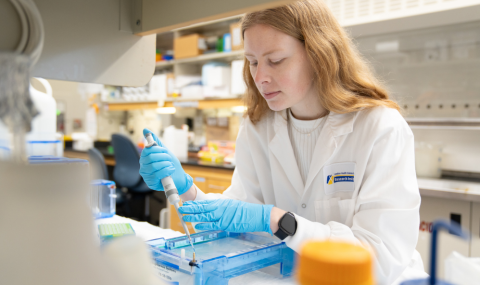Our team is comprised of the following health care professionals:
- Clinical Research Coordinator
- EEG Technologist
- Epilepsy Fellow
- Epilepsy Navigator
- Epileptologists and Neurosurgeons
- Nursing
- Psychology and Neuropsychology
- Social Worker
Clinical Research Coordinator
- The research coordinator has extensive experience in epilepsy research clinical trials.
- Actively recruits eligible patients from the Epilepsy Monitoring Unit.
- Provides information on research studies to eligible patients, obtains informed consent, and coordinates various study activities.
- Most of the study visits occur on an outpatient basis, but some can occur while in the Epilepsy Monitoring Unit
EEG Technologist
- An electroencephalographic (EEG) technologist is a trained medical professional who uses specialized equipment to locate electrical brain abnormalities
- They work under the supervision of doctors and neurologists
- Assist in the coordination of care by facilitating EEG tests around outpatient appointments and while patients are admitted to the hospital
- Provide testing for routine EEGs, Epilepsy Monitoring Unit (EMU) admissions, inpatient urgent EEG as well as highly specialized intra-operative and invasive EEGs tests in and outside of the OR
Epilepsy Fellow
- A fellow is a neurologist who is getting additional formal training in epilepsy.
- Often the fellow is present during your clinic visit and/or hospital stay. As part of their learning objectives, they actively participate and contribute towards your care.
- They have clinical expertise in epilepsy, from diagnosing to medication management.
Epilepsy Navigator
- Is a member of the Epilepsy Patient Care Team who actively strives to serve as a patient advocate, educator and support person for patients diagnosed with Epilepsy.
- Collaborates with an interdisciplinary team that includes staff from LHSC and our community partners to facilitate a smooth and seamless transition of patients with epilepsy across the healthcare continuum.
- Uses the best evidence available to support patient and/ or family education to promote self-management for optimal health for patients diagnosed with epilepsy.
Sara Hammoud, Epilepsy Navigator
Sara Hammoud is a registered nurse who has been serving in the role of Epilepsy Navigator since September 2022. She receives all new referrals for admission to the EMU. She will contact you by phone, provide you with information, answer questions and work with you to coordinate a time for admission within the limits of the fluctuating waitlist. She will also contact you about two weeks after discharge to discuss any concerns you may have related to your stay. You should receive her card with the contact number on discharge and you can call her with issues or questions before your first follow-up appointment.
Epileptologists and Neurosurgeons
Epileptologist
- An Epileptologist is a neurologist who has specialized training and experience in the management of epilepsy.
- Our Epileptologists have clinical expertise in EEG interpretation, diagnosing epilepsy, and creating various treatment plans (including medications and epilepsy surgery).
- After an initial consultation with you, an individual plan of care is established. Follow-up appointments are individualized to best meet your health needs.
Jorge Burneo, MD, MSPH
- Professor of Neurology
- Research Interests / Specializations: Epilepsy, EEG
David Diosy, MD, FRCPC
- Assistant Professor of Neurology
- Research Interests / Specializations: Epilepsy
Michelle-Lee Jones, MDCM, FRCPC, CSCN diplomate EEG
- Assistant Professor of Neurology
- Research Interests / Specializations: Clinical neurophysiology, EEG, tuberous sclerosis complex (TSC), epilepsy surgery, medically refractory epilepsy, medical education
Ana Suller Marti
- Assistant Professor of Neurology
- Research Interests / Specializations: Epilepsy & EEG
Giovanni Pellegrino, MD
- Assistant Professor of Neurology
- Research Interests / Specializations: Epilepsy, Multimodal Neuroimaging, Neurophysiology, Brain Stimulation
Neurosurgeon
The neurosurgeon is a surgeon who has had special training in brain surgery. Our neurosurgeon has surgical expertise in epilepsy:
- focal resections
- disconnective procedures (hemispherotomy)
- subdural electrode placement
- implantation of vagal nerve stimulator and robot-assisted Stereo-electro-encephalogram (SEEG)
After an initial consultation with you, an individual plan of care is established. Follow-up appointments are individualized to best meet your health needs
Dr. Jonathan Lau, MD, PhD, FRCSC
- Assistant Professor of Neurosurgery
- Research Interests / Specializations: Minimally invasive and hybrid surgical approaches, Epilepsy Surgery,
- Neuromodulation, Neuro-Oncology, Movement Disorder Surgery, Parkinson's Disease Surgery, Peripheral Nerve Surgery, Cerebral Endoscopic Surgery
Keith MacDougall, MD, FRCSC
- Assistant Professor of Neurosurgery
- Research Interests / Specializations: Neuro-oncology, Chronic Pain Surgery, Epilepsy Surgery, Movement Disorder Surgery, Parkinson's Disease Surgery
David Steven, MD, MPH, FRCSC, FACS
- Professor of Neurosurgery
- Research Interests / Specializations: Epilepsy Surgery
Nursing
- The nurses in the Epilepsy Monitoring Unit have received specialized training in seizure management and provide a wide range of care for their patients.
- They work as a member of the interdisciplinary team to coordinate tests, examinations and consultations to ensure the best possible care.
- As well, they will identify your health needs and advocate for you.
- The nurses will provide information and education in regards to new diagnosis, seizure medication management and plan of care.
Psychology and Neuropsychology
Clinical Psychologist
- A Clinical Psychologist is a psychologist who helps figure out how mood, stress, coping, and personality play a role in health and particularly with respect to seizures.
- Mood, anxiety, stress, sleep, substance use, and other factors are all common concerns for people with epilepsy and can influence epileptic seizures and psychogenic non-epileptic seizures.
- Clinical psychological assessment may include diagnostic interviews and questionnaires.
- Results and information can be provided to patients, as well as to other members of the Epilepsy Team, to help with clinical care and treatment decision-making, and to maximize daily functioning.
- Psychological treatment may be offered to treat psychological concerns like mood or anxiety disorders, sleep difficulties, coping with stress, reducing substance use, and treating psychogenic non-epileptic seizures. Individual and group treatment may be offered.
- The clinical psychologist may also consult with treating health providers in the community (e.g., counsellors, psychotherapists, family physicians, etc.) or facilitate referrals to appropriate community resources
Dr. Sarah Vernon-Scott, Ph.D., C. Psych.
Clinical Neuropsychology
- A clinical neuropsychologist is a psychologist who has specialized training in understanding the relationship between the brain and behaviour.
- Neuropsychologists provide a comprehensive assessment of thinking skills (e.g., intelligence, attention, learning, memory, language, visual-spatial skills, fine motor skills) as well as an examination of behaviour and mood.
- Neuropsychological assessment may include diagnostic interviews, questionnaires, and objective cognitive testing (e.g., paper-and-pencil tasks, answering questions, completing puzzles, etc.).
- A person’s unique pattern of strengths and weaknesses in thinking, learning, and behaviour: can help determine where seizures are coming from or how medical factors might be affecting thinking; serves as a good baseline for any future evaluations, and helps to generate information about potential risks and benefits with respect to surgical candidacy and decision-making.
- Neuropsychologists are involved in specialized procedures for certain patients, including the intracarotid amytal (eSAM/Wada) procedure, and electrocortical stimulation mapping of language and eloquent brain regions.
- Results and information are provided to patients, as well as to other members of the Epilepsy Team, to help with clinical care and treatment decision-making, and to maximize daily functioning.
Dr. Brent Hayman-Abello, C. Psych.
Dr. Sue Hayman-Abello, C Psych.
Dr. Tara McAuley, PhD, Clinical Neuropsychology
Psychometry
- A psychometrist administers and scores the relevant cognitive tests under the supervision of the clinical neuropsychologist.
- The testing is conducted in a standardized way, to obtain accurate and reliable results.
- Patients may spend several hours working one-on-one with the psychometrist in a quiet office.
- The psychometrist also assists with specialized epilepsy procedures like eSAM/Wada and cortical mapping.
Rukham Ajaz, Psychometrist, MSc
Sabrina Ford, Psychometrist, MSc
Social Worker
- The social worker is available to patients and families to provide supportive counselling in the hospital.
- Families may benefit from discussing emotional, housing, financial, transportation, family and other related concerns with a social worker.
- The social worker can assist with information and help the patient connect with community resources and/or available financial programs.
- The social worker is an important member of the care team that helps to bring in the patient’s perspective and understanding into the care team.


